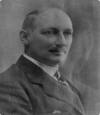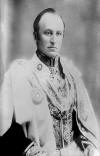 Colonel Charles Howard Bury |
The Life and Times
|
 Lord Curzon Viceroy of India 6 January 1899 18 November 1905 |
Colonel Charles Howard-Bury was elected as the Conservative MP for Bilston at the 1922 General Election, narrowly beating celebrated union man and Labour stalwart John Baker in a surprise victory.
The Colonel would hold on to his Bilston seat in the surprise election of 1923, before being ousted by a vengeful Baker the following year, defeating Howard-Bury with the support of renowned electoral agent and spin doctor Sam Hague.
Here local historian and PhD researcher, Greig Campbell, explores the life of the good Colonel . . .
During his short-time as MP for Bilston the Colonel involved himself in both local and national affairs – being assigned as the Private Secretary to the then Secretary of State for War, Edward Stanley – the 17th Earl of Derby. Perhaps his most telling contributions to Parliament were those concerning international affairs, making statements on debates surrounding Indian and Irish nationalism, as well as the persecution of religious minorities in Russia.
The Colonel’s fascination with foreign diplomacy is perhaps unsurprising. Born in London in 1881, he was the only child of Captain Kenneth Howard and Lady Emily Bury, wealthy socialites and part-time explorers whom had met during a botanical expedition in Algeria. Upon the death of his father in 1884,
Howard-Bury was adopted by Lord Lansdowne, the then Viceroy of India, and was brought up in the Dolomites of Austrian Tyrol – where he developed a passion for climbing, hill-walking, photography and botany.
After graduating from Sandhurst in 1905 with the rank of Captain, Charles became the first ‘Westerner’ to enter the forbidden land of Tibet – reading the works of the Krishnamuriti and meeting the Dhalai Lama.
The following year he embarked on a pilgrimage along the River Ganges, receiving teaching from Sanskrit scholars and killing a man-eating tiger that had carried off and eaten 21 ‘fakirs’ or holy men.
Over the next decade Howard-Bury would become one of the few ‘Westerners’ to traverse Siberia, the great foothills of Central Asia and the Tien Shan Mountain range, which divides modern-day Kyrgystan and China – becoming fluent in 27 local dialects along the way.